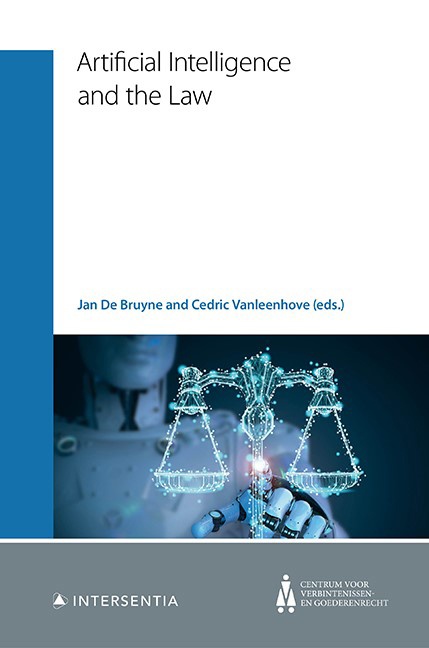Book contents
- Frontmatter
- Contents
- Foreword
- Contributing Authors
- Chapter 1 Basic Concepts of AI for Legal Scholars
- Chapter 2 Different Models of Innovation and Their Relation to Law
- Chapter 3 Setting the Scene: On AI Ethics and Regulation
- Chapter 4 Quantitative Legal Prediction: the Future of Dispute Resolution?
- Chapter 5 AI Arbitrators … ‘Does Not Compute’
- Chapter 6 AI through a Human Rights Lens. The Role of Human Rights in Fulfilling AI’s Potential
- Chapter 7 Killer Robots: Lethal Autonomous Weapons and International Law
- Chapter 8 AI and Data Protection: the Case of Smart Home Assistants
- Chapter 9 AI and IP: a Tale of Two Acronyms
- Chapter 10 Tax and Robots
- Chapter 11 Robotisation and Labour Law. The Dark Factory: the Dark Side of Work?
- Chapter 12 The Hypothesis of Technological Unemployment Caused by AI-Driven Automation and its Impact on Social Security Law
- Chapter 13 AI in Belgian Contract Law: Disruptive Challenge or Business as Usual?
- Chapter 14 Tort Law and Damage Caused by AI Systems
- Chapter 15 Insurance Underwriting on the Basis of Telematics: Segmentation and Profiling
- Chapter 16 AI and Creditworthiness Assessments: the Tale of Credit Scoring and Consumer Protection. A Story with a Happy Ending?
- Chapter 17 AI and the Consumer
- Chapter 18 Robots and AI in the Healthcare Sector: Potential Existing Legal Safeguards Against a(n) (Un)justified Fear for ‘Dehumanisation’ of the Physician-Patient Relationship
Foreword
Published online by Cambridge University Press: 26 May 2021
- Frontmatter
- Contents
- Foreword
- Contributing Authors
- Chapter 1 Basic Concepts of AI for Legal Scholars
- Chapter 2 Different Models of Innovation and Their Relation to Law
- Chapter 3 Setting the Scene: On AI Ethics and Regulation
- Chapter 4 Quantitative Legal Prediction: the Future of Dispute Resolution?
- Chapter 5 AI Arbitrators … ‘Does Not Compute’
- Chapter 6 AI through a Human Rights Lens. The Role of Human Rights in Fulfilling AI’s Potential
- Chapter 7 Killer Robots: Lethal Autonomous Weapons and International Law
- Chapter 8 AI and Data Protection: the Case of Smart Home Assistants
- Chapter 9 AI and IP: a Tale of Two Acronyms
- Chapter 10 Tax and Robots
- Chapter 11 Robotisation and Labour Law. The Dark Factory: the Dark Side of Work?
- Chapter 12 The Hypothesis of Technological Unemployment Caused by AI-Driven Automation and its Impact on Social Security Law
- Chapter 13 AI in Belgian Contract Law: Disruptive Challenge or Business as Usual?
- Chapter 14 Tort Law and Damage Caused by AI Systems
- Chapter 15 Insurance Underwriting on the Basis of Telematics: Segmentation and Profiling
- Chapter 16 AI and Creditworthiness Assessments: the Tale of Credit Scoring and Consumer Protection. A Story with a Happy Ending?
- Chapter 17 AI and the Consumer
- Chapter 18 Robots and AI in the Healthcare Sector: Potential Existing Legal Safeguards Against a(n) (Un)justified Fear for ‘Dehumanisation’ of the Physician-Patient Relationship
Summary
Artificial intelligence (AI) is becoming increasingly more prevalent in our daily social and professional lives. AI can be of benefit to a wide range of sectors such as healthcare, energy consumption, climate change and financial risk management. AI can also help to detect cybersecurity threats and fraud as well as enable law enforcement authorities to fight crime more efficiently. AI systems are more accurate and efficient than humans because they are faster and can better process information. They can perform many tasks ‘better’ than their human counterparts. Companies from various economic sectors already rely on AI applications to decrease costs, generate revenue, enhance product quality and improve competitiveness. AI systems and robots can also have advantages for the specific sector in which they are to be used. Take the example of autonomous vehicles. Transport will become more time-efficient with autonomous car technology. Self-driving cars will also enable people currently facing restrictions for operating a vehicle – such as the elderly, minors or disabled people – to fully and independently participate in traffic. Traffic will become safer as well. The number of accidents will decrease as computers are generally much better drivers than humans.
At the same time, however, the introduction of AI systems and robots will present many challenges. These will only become more acute in light of the predicted explosive growth of the robotics industry over the next decade. AI has implications for various facets of our society. Some even predict that AI systems can completely eradicate humanity in the long run. There are also several important ethical issues associated with (programming and using) AI systems. The commercialisation of AI will pose several challenges from a legal and regulatory point of view as well.
In this comprehensive book, scholars from various legal disciplines critically examine how AI systems may have an impact on Belgian law. While specific topics of Belgian private and public law are thoroughly addressed, the book also provides a general overview of a number of regulatory and ethical AI evolutions and tendencies in the European Union. The book additionally explains basic AI-related concepts such as machine learning, robots, Internet of Things and expert systems.
- Type
- Chapter
- Information
- Artificial Intelligence and the Law , pp. xvii - xxiiPublisher: IntersentiaPrint publication year: 2021



